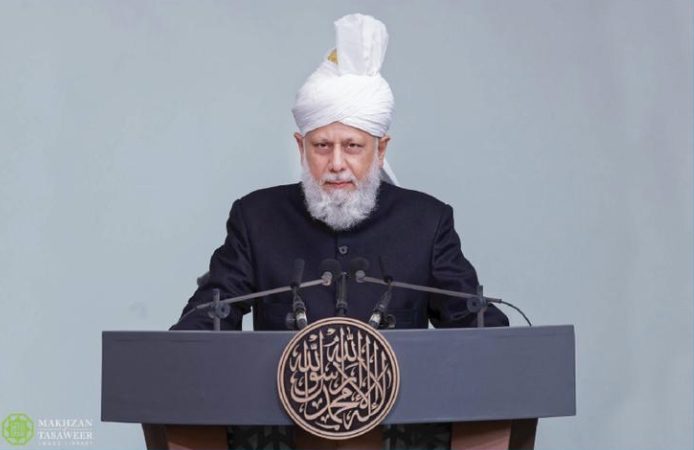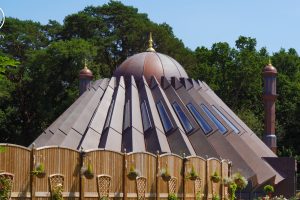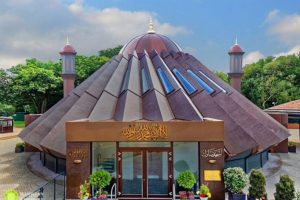After reciting Tashahhud, Ta‘awwuz and Surah al-Fatihah, His Holiness, Hazrat Mirza Masroor Ahmad (aba) said that he would continue mentioning details regarding the Battle of Tabuk.

Incidents Along the Journey to Tabuk
His Holiness (aba) said that after the Muslim army departed for the battle, the first place the Holy Prophet (sa) set up camp was Dhu Kushab, which was at a distance of a one-night journey from Madinah. It is recorded that for the duration of this journey, the Holy Prophet (sa) combined the early afternoon prayer (Zuhr) and the late afternoon prayer (Asr) and then also combined the early evening prayer (Maghrib) and late evening prayer (Isha).
His Holiness (aba) said that during the journey, the Holy Prophet (sa) performed ablution before prayer by washing his hands three times, washing his face, washing his arms up to the elbows, and passing his wet hands over his leather shoes.
It is also recorded that during the journey, Hazrat Abdur Rahman bin Auf (ra) was appointed to lead the prayer. The Holy Prophet (sa) joined the prayer during the second unit of prayer, and after the congregational prayer was over, he stood up to complete his prayer. The other Muslims grew worried; however, after completing his prayer, the Holy Prophet (sa) appreciated them and said that they had done well to join the prayer on time.
His Holiness (aba) said that as the Holy Prophet (sa) passed by the valley of Hijr, he told the Muslims not to enter the area of those who had caused Muslims great grief, unless the Muslims were in a dire situation and had no other option. The Holy Prophet (sa) then used his cloak to cover his face, and according to another narration, he also covered his head. Hijr is where the Prophet Saleh’s (ra) people, Thamud, resided. This was a lush valley, and its people had been granted an abundance of bounties by God. However, the Prophet Saleh’s (as) camel was a sign for them, which they hamstrung, drawing the displeasure of God, who took their bounties away. These people have been mentioned in the Holy Qur’an as the People of Hijr, and there is a chapter in the Holy Qur’an titled al-Hijr.
His Holiness (aba) said that as the Holy Prophet (sa) was travelling to Tabuk, his camel Qaswah became lost on the way. The companions searched for the camel. Among them was Hazrat Ammarah (ra), who had also been present during the Battle of Badr. He had with him in his tent a Muslim who used to be a Jew; however, though he had apparently accepted Islam, he was in fact a hypocrite. When the camel became lost, he said that if the Holy Prophet (sa) was a prophet, then he should have known the whereabouts of this camel. Immediately, God informed the Holy Prophet (sa) of the exact whereabouts of the camel. Upon learning what this man named Zaid said, Hazrat Ammarah (ra) expelled him from his tent.
His Holiness (aba) said that during the journey, the Muslim’s rations became depleted. The Muslims asked the Holy Prophet (sa) if they could sacrifice some of their riding camels for their meat and fat. Upon this, Hazrat Umar (ra) said to the Holy Prophet (sa) that this would deplete their riding animals. He suggested that everyone should gather their remaining rations, and the Holy Prophet (sa) could pray over them. The Holy Prophet (sa) agreed and did exactly that. After praying over the rations, everyone was able to eat to their full satisfaction, with some still left over.
His Holiness (aba) said that during the journey, there was a fight between two individuals, causing their hands to become cut and for one to even lose his front teeth. The man who lost his teeth said to the Holy Prophet (sa) that he should be given blood money for his loss. The Holy Prophet (sa) said that blood money did not apply in this circumstance. Hence, this shows that recompense is given based on circumstances.
His Holiness (aba) said that while on the journey, the Muslim army passed by a date orchard, and the Holy Prophet (sa) told the Muslims to guess the number of dates in this orchard. The Holy Prophet (sa) himself guessed that it would be 10 wasq. The Holy Prophet (sa) told the owner of the orchard to remember the weight of the dates when she picked them. On the way back from the battle, when the Muslims passed by the orchard and asked the owner about the weight of the dates, she said that it was 10 wasq in weight, exactly as the Holy Prophet (sa) had estimated.
Troubles Faced By the Muslims & Arrival at Tabuk
His Holiness (aba) said that upon arriving in Tabuk, the Holy Prophet (sa) warned the Muslims that there would be a storm that night, and so he instructed that no one should remain standing, the camels should be tied, and no one should go out alone, but rather everyone should go out in pairs. That night, there was a severe storm, and if someone was standing, they would be swept off their feet and blown away. After the storm, the Muslims had no water. The Holy Prophet (sa) prayed, and a cloud appeared which rained down on them.
His Holiness (aba) said that while on the journey, it is recorded that the Muslims were suffering from severe thirst and the heat was very strong. One person even slaughtered his camel, took the water from its belly and drank that and saved the rest for himself. Under these circumstances, the Muslims requested the Holy Prophet (sa) to pray. The Holy Prophet (sa) raised his hands in prayer, and while the Holy Prophet’s (sa) hands were still raised, a cloud appeared, and it began to rain, and it did not rain anywhere else except where the army was.
His Holiness (aba) that one day, during the journey to Tabuk, the Holy Prophet (sa) told the Muslims that the next day they would reach the spring of Tabuk and that no one should touch the water until the Holy Prophet (sa) arrived there. However, the next day, two individuals who had gone ahead took some of the water, and when the Holy Prophet (sa) learned of this, he scolded them. When the Holy Prophet (sa) arrived at the spring, he used its water to wash his face and hands and then poured the water back into the spring. Upon this, the spring began to flow rapidly and everyone was able to drink to their full. Then, the Holy Prophet (sa) said to Hazrat Mu’adh (ra) that if he lived long enough, he would witness this area to become lush with orchards. Later, it turned out that this was the very place where Hazrat Mu’adh (ra) was buried, and testimonies show that this very area became extremely lush and green with foliage and orchards, exactly as the Holy Prophet (sa) had foretold.
His Holiness (aba) said that Hazrat Abbad bin Bishr (ra) was appointed to lead the special security detail during the Battle of Tabuk. He and his team would circle the army and ensure their safety. It turned out that a group of Muslims had taken it upon themselves to go out and ensure the protection of this security detail as well. When the Holy Prophet (sa) learned of this, he was pleased and he prayed for them.
His Holiness (aba) said that every time the Muslims set up camp along the way to Tabuk, some would get left behind when the Muslim army departed. When this would be reported to the Holy Prophet (sa), he would say that if it was God’s will, then they would rejoin the army. Once, this happened to Hazrat Abu Dharr (ra), who was being troubled by his camels. Ultimately, he left his camels and walked until he rejoined the Holy Prophet (sa) and the Muslim army.
His Holiness (aba) said that a new Muslim named Hazrat Wasilah (ra) accepted Islam a few days prior to the Muslims’ departure from Madinah for Tabuk. When he heard the announcement to make preparations for the battle, he went to his home, but by the time he returned, the army had left. Hazrat Wasilah (ra) called out, asking if anyone would be willing to take him along with them to Tabuk, and he would give them his share of spoils in return. An elderly man agreed and took him along. Later, when Hazrat Wasilah (ra) received his share of spoils and tried giving it to the elderly man, he refused to take it, saying that receiving this had not been his purpose.
His Holiness (aba) said that he would continue mentioning these details in the future.
Appeal for Prayers in Light of Increasing Opposition to Ahmadis
His Holiness (aba) made an appeal for prayers for those who were injured during the recent mosque attack in Rabwah, Pakistan; may Allah keep them in HIs protection and grant them swift and complete recovery. May Allah render futile every ploy made by the opponents of Ahmadiyyat in Pakistan. There was a rally being held today in Rabwah in the name of “Khatm-e-Nabuwwat”, where clerics spewed filth and nonsense. May Allah the Almighty protect everyone from this.
His Holiness (aba) also made an appeal for prayers for the Ahmadis in Bangladesh, where opponents seem to have very dangerous ploys. May Allah the Almighty protect every Ahmadi there.
His Holiness (aba) appealed for prayers for the Palestinians; may Allah have mercy on them and free them from their oppressors. The ceasefire that was touted is only in name. The events of the previous two days prove that this ceasefire was in name alone. May Allah save these oppressed people from further cruelties and bring the oppressors to task.
Summary prepared by The Review of Religions




Add Comment